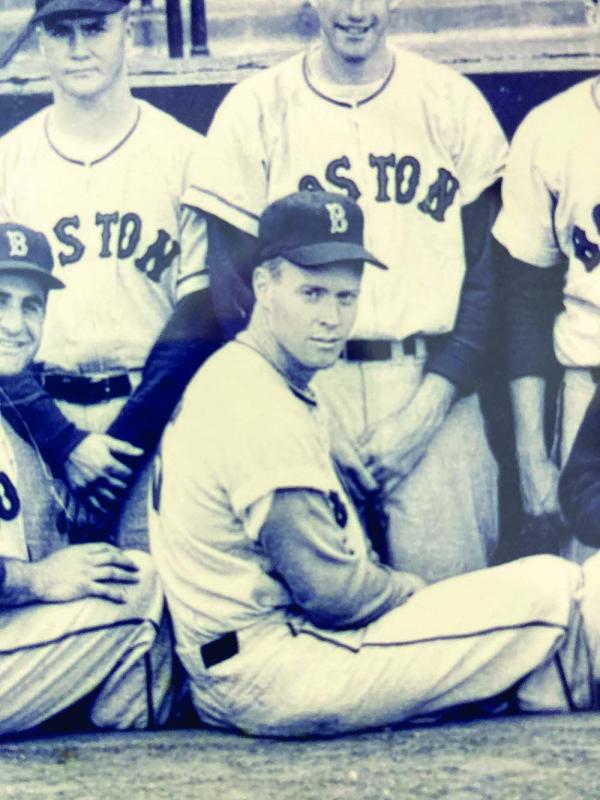March 4, 2021

"Red O'Hara" as a BU Terrier star.
There was a time when “Red” O’Hara seemed destined for a stellar career on the national sports scene. Then love and a longing for home turned everything around. In the wake of his death, family and friends have been reflecting on the decision that changed the course of Joe’s long life.
During the 1953-54 high school season at Christopher Columbus High, “Red” was a coach’s dream. “He’s just one of those natural athletes who can do anything in any sport,” his baseball coach Bob DiGuglialimo, told a Boston sportswriter . An All-Scholastic in both football and baseball, he was firmly in the sights of big-league scouts.
But for Joe, there was no place like Hemenway Park, a large facility along Adams Street in the middle of Dorchester close to the harbor.
“We’d go every day when we were kids and stay there until suppertime,” says Johnny Bitetti, one of Joe’s lifelong friends from their “Hemmy” days. “Whoever got there first got the big diamond. You had to fight for it.”
His buddies recognized his talents. “He was a natural,” says Jack Kearns, who would go on to pitch in a Canadian league. “Everything he did was right.”
Many colleges scouted him, including Notre Dame. But he decided to stay close to home, enrolling at Boston University where he was the shortstop on the varsity and ran up a batting average of .338 over 18 games, and scored 30 runs. He planned to play football, too, but pro baseball was not to be denied, at least for a while.
The scouts swooped in, one of them calling Joe “the best prospect I have ever seen come out of the entire New England area.” He attended a Philadelphia Phillies tryout camp, and the Red Sox and Cubs were interested. But ultimately – his friends say it was not an easy decision – he signed with the Kansas City Athletics for a $4000 bonus and reported to camp in the summer of 1956. He was going pro.
The change of heart came swiftly: Homesick, disenchanted with the stresses of training camp, and only ten minor league games into his career, he returned home to Templeton Street, Dorchester.
Harry Cleverly, Joe’s baseball coach at BU, told a Boston newspaper he was not surprised by Joe’s return. “He’s just a homebody at heart,” he said. “He just can’t stand being away from the neighborhood gang.”
There was another reason, of course; there always is, and this one hit close to home. “I think he was in love with your sister,” Marguerite Collins, Joe’s only sibling, said to me. For my part, I remember the day he came over to our Neponset Avenue house, his red hair shaved off for training camp. My sister Anne was very glad to see him.
Joe resumed classes at BU, where Anne worked as a secretary. But, because he had turned pro, NCAA rules barred him from resuming competitive collegiate athletics. Still strong and fit, he went back to playing with the old neighborhood gang – Kearns, Bitetti, Frank Porter, Gerard “Radi” Kenneally, all members with Joe of the McCormack Club of the Boston Park League.
On June 6, 1959, 22-year-old Joe O’Hara married my 20-year-old sister Anne at St. Ann’s Church. The “Hemmy” crowd bought him four new tires for the honeymoon trip to Lake George. When they returned home, he looked after his Irish-born parents, began a 38-year career with Boston Edison as lineman and supervisor, raised three daughters and a son, and focused on being a husband and father.
“He encouraged all of us to be confident, hard-working, fair, and loyal to family and friends,” says his youngest daughter Kathleen.”There was never any doubt he loved us and had our backs.”
Joe remained active and healthy until Anne’s death (pancreatic cancer) in 2016. After two strokes and a steady decline, he died in hospice care, his loving family by his side.
Joe will be laid to rest next to Anne in Sarasota, but he had requested that a portion of his ashes be sprinkled over the grounds at the “Hemmy.” For him, there was no greater time than the hours he spent there as a youth playing for a dream.




